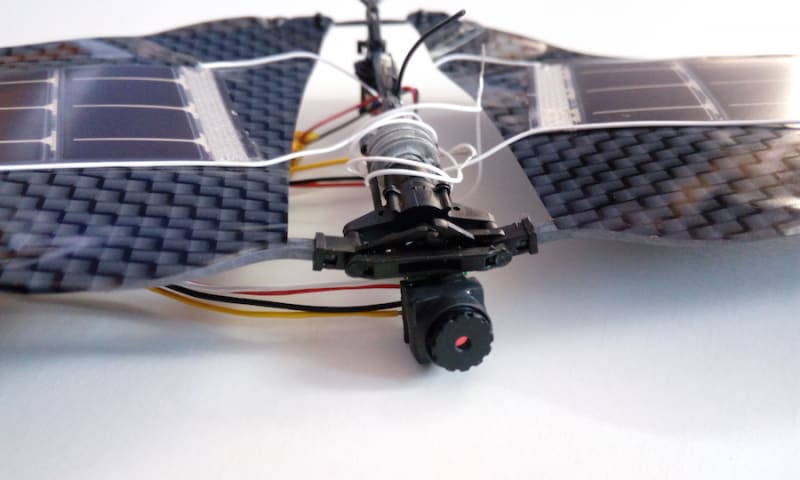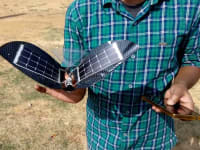Solar Robo Warbler is a Solar Flapping Wing Air Vehicle (SFWAV). Like most ornithopters (robot birds), this vehicle relies on compliant wing structures that deform the wings while flapping to generate the necessary forces for aerodynamic flight. To make sure the force generated by the wings is enough to maintain flight, the FWAVs are made from lightweight materials to minimize payload. This also limits the onboard energy available for the vehicle resulting in short flights. To extend the flight time of Robo Warbler, flexible solar cells can be introduced throughout the vehicle to harvest energy from the sun while in and out of flight. More energy was harvested for the vehicle allowing for longer flights and for the vehicle to recharge without the use of a battery charger.
SOLAR CELL INTEGRATION TO THE WINGS
Solar Robo Warbler is a Solar Flapping Wing Air Vehicle (SFWAV). Robo Warbler weight is 13 g with a wingspan of 33 cm. The wing was comprised of a carbon fiber skeleton held together by a Mylar membrane. This geometry allows the wings to undergo a passive deformation that is crucial to endurance, speed, manoeuvrability, climbing, gliding, and other behaviours. Integrating solar cells into the wings do affect these capabilities; therefore, thin flexible solar cells were chosen to minimize these detrimental effects. The solar modules chosen for integration were Power film’s MP3-37 flexible solar cell modules. These flexible 3.6 x 11.4 cm solar cells are reported by the manufacturer to produce 50mA of current at 3V. However, these commercial modules came with an encapsulation that was too thick and stiffened the cells. By removing the encapsulation, the solar modules were thinner and less stiff, making them more compatible with the Mylar membrane.
Present robotic birds required to charge before they can fly a few minutes. This particular bird is equipped with flexible solar panels in its wings. These solar panels are producing electrical power. During the flying time, these solar panels produce power and recharge the battery. The length of solar robo warbler is 8 cm and weight only 13 grams. It is made in light weight carbon fiber material. It is equipped with a 1.6 grams Nano wireless video camera. This camera takes photos and videos which are sent to a ground station. Solar robo warbler is the lightest and smallest solar flapping wings robotic bird in the world.
SPECIFICATIONS
Size : 8 cm, from wingtip to wingtip
Weight : 13 grams
Battery : 1.6 grams
Camera & transmitter: 1.6 grams
Motor : 3 grams
Receiver: 0.6 grams
Mechanism: 3.8 grams
Solar panels: 2.4 grams (Two flexible panels using, each 1.2 grams)
Material : Carbon fiber
In near future this type of robotic birds are used to help rescue people trapped in destroyed buildings, military and defence applications, search for criminals or even operate as a probe vehicle an Mars.
Video
Like this entry?
-
About the Entrant
- Name:Eranna B
- Type of entry:individual
- Software used for this entry:CATIA V5
- Patent status:none








